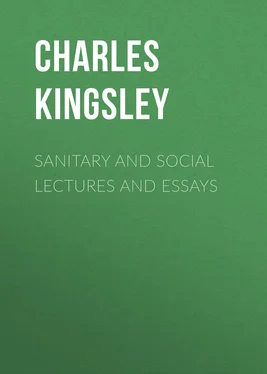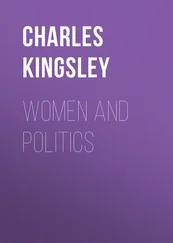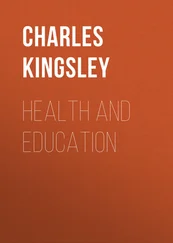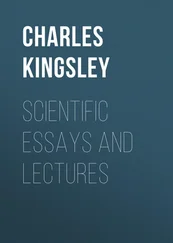Charles Kingsley - Sanitary and Social Lectures and Essays
Здесь есть возможность читать онлайн «Charles Kingsley - Sanitary and Social Lectures and Essays» — ознакомительный отрывок электронной книги совершенно бесплатно, а после прочтения отрывка купить полную версию. В некоторых случаях можно слушать аудио, скачать через торрент в формате fb2 и присутствует краткое содержание. Жанр: foreign_prose, sociology_book, foreign_antique, на английском языке. Описание произведения, (предисловие) а так же отзывы посетителей доступны на портале библиотеки ЛибКат.
- Название:Sanitary and Social Lectures and Essays
- Автор:
- Жанр:
- Год:неизвестен
- ISBN:нет данных
- Рейтинг книги:4 / 5. Голосов: 1
-
Избранное:Добавить в избранное
- Отзывы:
-
Ваша оценка:
- 80
- 1
- 2
- 3
- 4
- 5
Sanitary and Social Lectures and Essays: краткое содержание, описание и аннотация
Предлагаем к чтению аннотацию, описание, краткое содержание или предисловие (зависит от того, что написал сам автор книги «Sanitary and Social Lectures and Essays»). Если вы не нашли необходимую информацию о книге — напишите в комментариях, мы постараемся отыскать её.
Sanitary and Social Lectures and Essays — читать онлайн ознакомительный отрывок
Ниже представлен текст книги, разбитый по страницам. Система сохранения места последней прочитанной страницы, позволяет с удобством читать онлайн бесплатно книгу «Sanitary and Social Lectures and Essays», без необходимости каждый раз заново искать на чём Вы остановились. Поставьте закладку, и сможете в любой момент перейти на страницу, на которой закончили чтение.
Интервал:
Закладка:
Society and British human nature are what they have become by the indirect influences of long ages, and we can no more reconstruct the one than we can change the other. We can no more mend men by theories than we can by coercion—to which, by-the-bye, almost all these theorists look longingly as their final hope and mainstay. We must teach men to mend their own matters, of their own reason, and their own free-will. We must teach them that they are the arbiters of their own destinies; and, to a fearfully large degree, of their children’s destinies after them. We must teach them not merely that they ought to be free, but that they are free, whether they know it or not, for good and for evil. And we must do that in this case, by teaching them sound practical science; the science of physiology as applied to health. So, and so only, can we cheek—I do not say stop entirely—though I believe even that to be ideally possible; but at least cheek the process of degradation which I believe to be surely going on, not merely in these islands, but in every civilised country in the world, in proportion to its civilisation.
It is still a question whether science has fully discovered those laws of hereditary health, the disregard of which causes so many marriages disastrous to generations yet unborn. But much valuable light has been thrown on this most mysterious and most important subject during the last few years. That light—and I thank God for it—is widening and deepening rapidly. And I doubt not that in a generation or two more, enough will be known to be thrown into the shape of practical and provable rules; and that, if not a public opinion, yet at least, what is more useful far, a widespread private opinion will grow up, especially among educated women, which will prevent many a tragedy and save many a life.
But, as to the laws of personal health: enough, and more than enough, is known already, to be applied safely and easily by any adults, however unlearned, to the preservation not only of their own health, but of that of their children.
The value of healthy habitations, of personal cleanliness, of pure air and pure water, of various kinds of food, according as each tends to make bone, fat, or muscle, provided only—provided only—that the food be unadulterated; the value of various kinds of clothing, and physical exercise, of a free and equal development of the brain power, without undue overstrain in any one direction; in one word, the method of producing, as far as possible, the mentem sanam in corpore sano, and the wonderful and blessed effects of such obedience to those laws of nature, which are nothing but the good will of God expressed in facts—their wonderful and blessed tendency, I say, to eliminate the germs of hereditary disease, and to actually regenerate the human system—all this is known; known as fully and clearly as any human knowledge need be known; it is written in dozens of popular books and pamphlets. And why should this divine voice, which cries to man, tending to sink into effeminate barbarism through his own hasty and partial civilisation: “It is not too late. For your bodies, as for your spirits, there is an upward, as well as a downward path. You, or if not you, at least the children whom you have brought into the world, for whom you toil, for whom you hoard, for whom you pray, for whom you would give your lives,—they still may be healthy, strong, it may be beautiful, and have all the intellectual and social, as well as the physical advantages, which health, strength, and beauty give.”—Ah, why is this divine voice now, as of old, Wisdom crying in the streets, and no man regarding her? I appeal to women, who are initiated, as we men can never be, into the stern mysteries of pain, and sorrow, and self-sacrifice;—they who bring forth children, weep over children, slave for children, and, if they have none of their own, then slave, with the holy instinct of the sexless bee, for the children of others—Let them say, shall this thing be?
Let my readers pardon me if I seem to write too earnestly. That I speak neither more nor less than the truth, every medical man knows full well. Not only as a very humble student of physiology, but as a parish priest of thirty years’ standing, I have seen so much unnecessary misery; and I have in other cases seen similar misery so simply avoided; that the sense of the vastness of the evil is intensified by my sense of the easiness of the cure.
Why, then—to come to practical suggestions—should there not be opened in every great town in these realms a public school of health? It might connect itself with—I hold that it should form an integral part of—some existing educational institute. But it should at least give practical lectures, for fees small enough to put them within the reach of any respectable man or woman, however poor, I cannot but hope that such schools of health, if opened in the great manufacturing towns of England and Scotland, and, indeed, in such an Irish town as Belfast, would obtain pupils in plenty, and pupils who would thoroughly profit by what they hear. The people of these towns are, most of them, specially accustomed by their own trades to the application of scientific laws. To them, therefore, the application of any fresh physical laws to a fresh set of facts, would have nothing strange in it. They have already something of that inductive habit of mind which is the groundwork of all rational understanding or action. They would not turn the deaf and contemptuous ear with which the savage and the superstitious receive the revelation of nature’s mysteries. Why should not, with so hopeful an audience, the experiment be tried far and wide, of giving lectures on health, as supplementary to those lectures on animal physiology which are, I am happy to say, becoming more and more common? Why should not people be taught—they are already being taught at Birmingham—something about the tissues of the body, their structure and uses, the circulation of the blood, respiration, chemical changes in the air respired, amount breathed, digestion, nature of food, absorption, secretion, structure of the nervous system—in fact, be taught something of how their own bodies are made and how they work? Teaching of this kind ought to, and will, in some more civilised age and country, be held a necessary element in the school course of every child, just as necessary as reading, writing, and arithmetic; for it is after all the most necessary branch of that “technical education” of which we hear so much just now, namely, the technic, or art, of keeping oneself alive and well.
But we can hardly stop there. After we have taught the condition of health, we must teach also the condition of disease; of those diseases specially which tend to lessen wholesale the health of townsfolk, exposed to an artificial mode of life. Surely young men and women should be taught something of the causes of zymotic disease, and of scrofula, consumption, rickets, dipsomania, cerebral derangement, and such like. They should be shown the practical value of pure air, pure water, unadulterated food, sweet and dry dwellings. Is there one of them, man or woman, who would not be the safer and happier, and the more useful to his or her neighbours, if they had acquired some sound notions about those questions of drainage on which their own lives and the lives of their children may every day depend? I say—women as well as men. I should have said women rather than men. For it is the women who have the ordering of the household, the bringing up of the children; the women who bide at home, while the men are away, it may be at the other end of the earth.
And if any say, as they have a right to say—“But these are subjects which can hardly be taught to young women in public lectures;” I rejoin—of course not, unless they are taught by women—by women, of course, duly educated and legally qualified. Let such teach to women, what every woman ought to know, and what her parents will very properly object to her hearing from almost any man. This is one of the main reasons why I have, for twenty years past, advocated the training of women for the medical profession; and one which countervails, in my mind, all possible objections to such a movement. And now, thank God, we are seeing the common sense of Great Britain, and indeed of every civilised nation, gradually coming round to that which seemed to me, when I first conceived of it, a dream too chimerical to be cherished save in secret—the restoring woman to her natural share in that sacred office of healer, which she held in the Middle Ages, and from which she was thrust out during the sixteenth century.
Читать дальшеИнтервал:
Закладка:
Похожие книги на «Sanitary and Social Lectures and Essays»
Представляем Вашему вниманию похожие книги на «Sanitary and Social Lectures and Essays» списком для выбора. Мы отобрали схожую по названию и смыслу литературу в надежде предоставить читателям больше вариантов отыскать новые, интересные, ещё непрочитанные произведения.
Обсуждение, отзывы о книге «Sanitary and Social Lectures and Essays» и просто собственные мнения читателей. Оставьте ваши комментарии, напишите, что Вы думаете о произведении, его смысле или главных героях. Укажите что конкретно понравилось, а что нет, и почему Вы так считаете.












